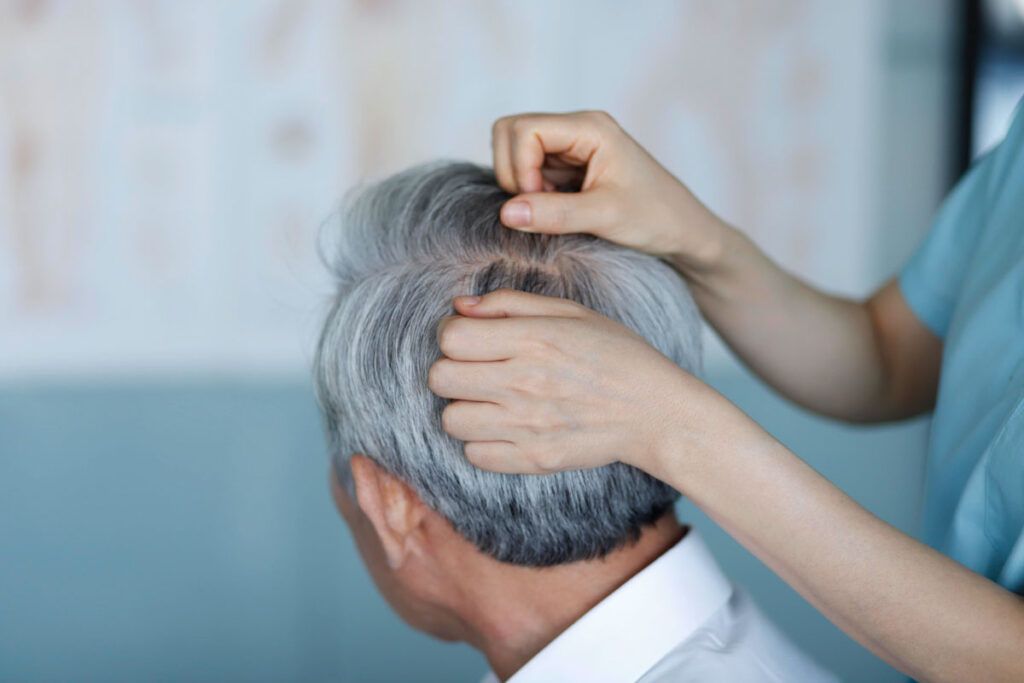Psoriasis can cause itchy, discolored, and dry patches all over your body and commonly develops on the scalp.
Around half of people living with psoriasis have symptoms on their scalp. This includes the hairline, forehead, back of the head, and the soft skin around your ears.
Scalp psoriasis can be uncomfortable, but various treatments can help you manage the condition more effectively.
Symptoms

Psoriasis that develops on the scalp is typically plaque psoriasis. This usually presents as thick or thin patches of scaly plaques across the scalp. Thicker patches of scalp psoriasis may result in temporary hair loss.
If you have light-colored skin, these plaques can look silvery-white, while, on skin of color, they are typically darker and more purple or brown in tone. Scalp psoriasis can cause extreme itchiness and make your scalp feel tight or sore.
Scalp psoriasis causes the scalp to flake, which is why some people might mistake it for dandruff, or seborrheic dermatitis.
Scalp psoriasis results from inflammation in the body caused by chronic disease. But seborrheic dermatitis usually results from an inflammatory reaction to a fungus. It is often due to genetic and environmental factors.
Also, seborrheic dermatitis looks yellow and greasy, while scalp psoriasis often looks powdery and silver.
Can it be cured?
There is no cure for any type of psoriasis. But using the right combination of treatments can help you manage your symptoms and avoid flare-ups. If you experience hair loss with your psoriasis, the hair typically grows back after the flare subsides.
A wide range of treatments are available to help you manage symptoms of scalp psoriasis. You may also benefit from seeing a skin specialist, or dermatologist.
A healthcare professional can recommend the most effective treatment plan for your condition and specific needs.
Medical treatments
You can apply many different topical medications to your skin or head to help manage symptoms of scalp psoriasis. Some are available over the counter (OTC), while others are prescription only.
Topical medications
Doctors often recommend medicated shampoos for mild scalp psoriasis to treat plaques topically.
These topical treatments can include:
| Name | Form | Use |
| salicylic acid (OTC) | shampoo | helps soften scale and plaques to reduce itchiness |
| coal tar (OTC) | shampoo | according to a 2018 review, coal tar helps slow the regrowth of skin cells on the scalp, a cause of plaques |
| anthralin (prescription) | Zithranol 1% anthralin shampoo | decreases inflammation on the scalp and helps reduce skin cell regrowth. |
| clobetasol (prescription) | Etrivex steroid shampoo, or a cream, ointment, or solution | reduces redness, swelling, and itchiness |
| tazarotene (prescription) | topical retinoid in lotion, cream, gel, or foam | applying this cream directly to the scalp before bedtime can help relieve symptoms |
| calcipotriene (prescription) | topical solution | applying this solution directly to the lesions on the scalp may help reduce thickness of plaques |
Systemic medications
If symptoms of scalp psoriasis are severe or do not respond to other treatments, your doctor may suggest oral or injectable medications to help treat the cause from the inside. These are systemic treatments.
These medications may cause side effects, so if you have any concerns, seek advice from a medical professional.
The table below lists some of the available systemic medications. You can talk with a healthcare professional for more options.
| Name | Type | How it works | Side effects |
| acitretin (Soriatane) | oral retinoid | Retinoids are a synthetic form of vitamin A. Because of this, you can only take this medication for a short while. | dry mouth, hair loss, mood changes, joint pain, among others |
| cyclosporine (Neoral) | oral immunosuppressant | Cyclosporine works to calm the immune system and reduce inflammation. This can reduce psoriasis symptoms. | headache, fever, nausea or vomiting, changes in heart rate or blood pressure, among others |
| adalimumab (Humira) | injectable biologic | Biologic medications reduce inflammation by influencing your body’s immune response. Manufacturers produce biologics using a living system, such as a microorganism, plant cell, or animal cell. | headache and rash, or more serious side effects like heart failure |
| apremilast | oral anti-inflammatory medication | Apremilast works by inhibiting the enzyme phosphodiesterase 4, which affects inflammation in your cells. | diarrhea, nausea, mood changes, insomnia, among others |
If you need help covering the cost of medications, the free Optum Perks Discount Card could help you save up to 80% on prescription drugs. Follow the links on drug names for savings on that medication, or search for a specific drug here.
